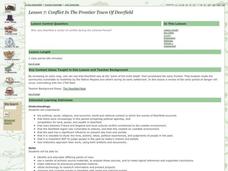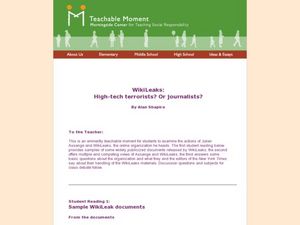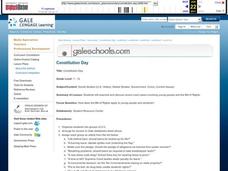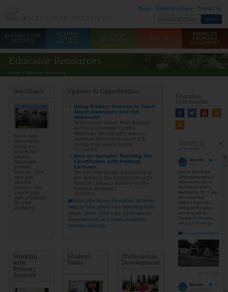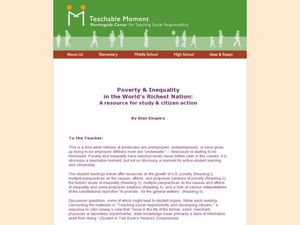The New York Times
Where to Draw the Line: Balancing Government Surveillance with the Fourth Amendment
The question of how to balance Fourth Amendment Rights with national security concerns becomes critical in an age of planned terrorist attacks, election interference, and fake news. Get young social scientists involved in the debate with...
Curated OER
Will the Supreme Court Vouch for Vouchers?
Students investigate past Supreme Court decisions that have centered on education issues and assess the ways in which those decisions have impacted American education. They consider the controversies surrounding the issue of school...
Curated OER
The Grapes of Wrath: Scrapbooks and Artifacts
Students interpret historical evidence presented in primary and secondary sources. In this Great Depression lesson plan, students read John Steinbeck's The Grapes of Wrath and use ethnographic research...
Curated OER
Conflict in the Frontier town of Deerfield
Students use primary sources to investigate, explore and represent varying perspectives on the 1704 Deerfield Raid. They consider the reasons Deerfield was at the center of English, French and Native American conflicts in the early 18th...
Curated OER
Independent - To Be Or Not To Be
Students examine national symbols of freedom and speech strategies. They study the constitution, forefathers, and the Declaration of Independence.
Curated OER
WikiLeaks: High-tech terrorists? Or Journalists?
Students investigate the credibility of WikiLeaks. In this history lesson, students read three WikiLeak articles, then answer questions that relate to each article.
Curated OER
Constitution Day
Students examine and discuss recent court cases involving young people and the Bill of Rights.They use a focus question to create the context for class discussion: How does the Bill of Rights apply to young people and students?
Curated OER
People's Rights Change With the Decisions of the Courts
Ninth graders research the Bill of Rights, and the difference between a conservative and a liberal court decision. They examine how peoples' rights are expanded or limited by court decisions.
NYC Department of Records
Citizenship and Elections: The Importance of a Ballot
Approximately 58 prcent of those eligible voted in the 2016 US Presidential election. In an attempt to impress upon learners the importance of voting and voting rights, class members examine primary source documents related to the...
University of North Carolina
Plagiarism
As many unfortunate journalists have learned, taking someone else's ideas and passing them off as your own is never a good idea. It's called plagiarism—and it's a big deal. Thankfully, a handout helps writers learn how to avoid...
Federal Judicial Center
Amistad and Dred Scott—a Comparative Activity
What do slaves fighting for their freedom on board a ship and a slave fighting for his freedom in a courtroom have in common? Budding historians investigate the two different cases of the Amistad slave revolt and the Dred Scott argument....
Curated OER
The Bill of Rights
Ninth graders research the Bill of Rights and consider which freedoms are the most important for them. They consider the Bill in detail and then write to their Congressperson about something they would like to see done or changed.
Curated OER
Constitutional Issues: Separation of Powers
Students discribe the principle and the history of separation of powers.
Curated OER
Read My Lips
Students research and examine Florida's government and the three branches of government. They write and present campaign speeches that explain the reasons why they would be the best candidates for governor.
Curated OER
Imposing Democracy
Twelfth graders discuss the probability of imposing a democracy in a country in which there is no history of this type of government being successful. Using the internet, they work together to research Japan's experience with democracy...
Curated OER
Poverty and Inequality in the World's Richest Nation
Young scholars examine poverty and inequality in America. In this current events lesson, students read the provided articles "Poverty," "Inequality Growing in America," "Inequality: Views on Causes, Effects, Remedies," and "Theories on...
Curated OER
Fighting for Democracy, Fighting for Me
Ninth graders investigate specific individuals involved in Operation Iraqi Freedom and working backward to stories from World War II. For this US History lesson, 9th graders read documents that depict the conflicts faced by individuals...
Curated OER
George Washington and the Rule of Law
learners compare The rule of law with the rule of men and consider life under each of these types of governments.In this government lesson, students read a primary source to examine the importance of the rule of law.They will also answer...
Curated OER
Harassment in the Hallways
Students participants clarify their values, personal beliefs and feelings regarding homosexuality. After reading the provided selection, students discuss their feelings towards homosexuals as well as what constitutes harassment.
Curated OER
Good and Bad Touches
Young scholars evaluate whether certain physical actions constitute a "good touch" or a "bad touch". In this sensitive health lesson, students are read a book about types of touches, and then compare and contrast between good and bad...
Curated OER
Redistricting: How Our Representatives Select Voters
Students examine the practice of redistricting. In this American politics instructional activity, students read the provided articles "The Gerrymander," and "Reforming the Gerrymander." Students respond to the provided discussion questions.
Curated OER
State v. Russell, Minnesota Supreme Court
Students examine the impact of court decisions. In this Minnesota Supreme Court activity, students read the State v. Russell case study regarding cocaine drug use. Students take notes on the case and respond to discussion questions...
Curated OER
United States Pride
Third graders learn the responsibility of citizenship and learn facts about a state they choose to research.
Curated OER
I Am a Book
Third graders discuss books that have been banned and the things that they have in common. They explore the concept of freedom of speech and write poems based on their discussion.





